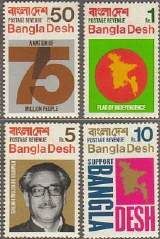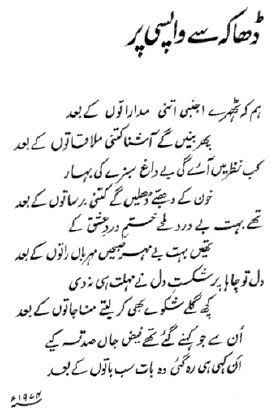Adil Najam
 As the fourth part of our series on the events of 1971, we are reposting this post which was first published at ATP on December 16, 2006. We are reposting it with all the original comments since they, as a whole, are very much part of the conversation we all need to have with ourselves. The previous three parts of the series can be read here, here and here.
As the fourth part of our series on the events of 1971, we are reposting this post which was first published at ATP on December 16, 2006. We are reposting it with all the original comments since they, as a whole, are very much part of the conversation we all need to have with ourselves. The previous three parts of the series can be read here, here and here.
Today is December 16.
Today Bangladesh will mark its 35th ‘Victory Day.’
 Most Pakistanis will go about their lives, not remembering or not wanting to remember. We should remember – and learn – from the significance of this date.
Most Pakistanis will go about their lives, not remembering or not wanting to remember. We should remember – and learn – from the significance of this date.
Not because it marks a ‘defeat’ but because it marks the end of a dream, 24 years of mistakes, horrible bloodshed, traumatic agony, and shameful atrocities. The constructed mythologies of what happened, why, and who is to be blamed need to be questioned. Tough questions have to be asked. And unpleasant answers have to be braced for. We need to honestly confront our own history, for our own sake.
But right now, the goal of this post is different. We at ATP just wish to extend a hand of friendship to our Bangladeshi friends. May the memories we make in our future be very different (and more pleasant) than the scars we carry from our past.
There is much – too much – that I wish to say; but cannot find words for. So let me do what I always do when I am at a loss of words. Let me quote Faiz Ahmad Faiz, who in his memorable 1974 poem ‘Dhaka say wapsi par’ (On Return from Dhaka) expressed what I wish to say so much better than I ever could.
We share with you here the original poem in Urdu, a version in ‘Roman Urdu,’ a wonderful English translation of the poem by the late Agha Shahid Ali in his book The Rebel’s Silhouette, and a video of Nayarra Noor singing the verses with the passion and feeling that they deserve.
ham ke Thehre ajnabi itni mulaaqaatoN ke baad
phir baneiN ge aashna kitni madaaraatoN ke baadkab nazar meiN aaye gi be daaGh sabze ki bahaar
khoon ke dhabe dhuleiN ge kitni barsaatoN ke baadthe bahut bedard lamhe khat’m-e-dard-e-ishq ke
theiN bahut bemeh’r subheiN meh’rbaaN raatoN ke baaddil to chaaha par shikast-e-dil ne moh’lat hi na di
kuchh gile shikwe bhi kar lete manaajaatoN ke baadun se jo kehne gaye the “Faiz” jaaN sadqe kiye
an kahi hi reh gayi woh baat sab baatoN ke baad
Agha Shahid Ali’s Translation:
After those many encounters, that easy intimacy,
. we are strangers now —
After how many meetings will we be that close again?When will we again see a spring of unstained green?
After how many monsoons will the blood be washed
. from the branches?So relentless was the end of love, so heartless —
After the nights of tenderness, the dawns were pitiless,
. so pitiless.And so crushed was the heart that though it wished
. it found no chance —
after the entreaties, after the despair — for us to
. quarrel once again as old friends.Faiz, what you’d gone to say, ready to offer everything,
. even your life —
those healing words remained unspoken after all else had
. been said.





















































Thank you for highlighting this issue. It is an important one. One practical step govt can take is to encourage more people to people contact between Pakistanis and Bangladeshis. For example, more sports, more cultural exchnges, more youth exchanges. Right now we have a first phase of history (pre-1971) which is or distrust and pain and another (post-1971) which is of silence. Now we shodul break the silence and heal teh pain.
As part of an effort to remember the 16 december 1971 and the plight of stranded pakistanis, Asian Broadcasting Network did a show on the plight of stranded pakistanis.
There was a call in guest Mr.Haroon Rashid who was born in 1971 and now is still in the camps and he is 35 years old.
Just listen to the first hand account of the ordeal that he and his fellows are going through in their camps. A great human tragedy which is still going on.
Here is the link to download the show.
P.S: The guest appears in the second hour of the show after the youth program.
Pakistan’s military regime did try to crush the Bengali rebellion by force, and many Bengalis did die for the cause of Bangladesh’s independence. Yet, not every allegation hurled against the Pakistan army was true.
The truth about the Jessore massacre
by Sarmila Bose
http://www.telegraphindia.com/1060319/asp/look/sto ry_5969733.asp
Hamoodur Rahman Commission Report .
This report was classified till 2000 when India published it in local news papers. Later Pakistan had to reveal this report anyway.
The Hamoodur Rahman commission report will answer *some* questions on the who, what and why. Some westerners also claim that what the Pakistani army did in East Pakistan was worst than what the Japanese army did in Nanking, China in 1937. In any case whether the Bengalis collaborated or not, I believe an apology is due from the people of Pakistan to the people of Bangladesh. That, in my opinion, will be a decent thing to do.